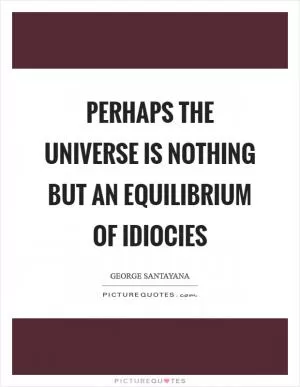The Fates, like an absent minded printer, seldom allow a single line to stand perfect and unmarred

The Fates, like an absent minded printer, seldom allow a single line to stand perfect and unmarred
In the realm of philosophy and literature, George Santayana is often regarded as a profound thinker who delved into the complexities of human existence and the nature of reality. His writings often explore themes of fate, destiny, and the interconnectedness of all things. The quote, “The Fates, like an absent minded printer, seldom allow a single line to stand perfect and unmarred,” encapsulates Santayana’s belief in the unpredictable and often chaotic nature of life.Santayana’s philosophy is deeply rooted in the idea that the world is constantly in flux, and that nothing is ever truly fixed or permanent. Just as a printer may make mistakes or errors in the printing process, so too do the Fates make errors in the course of human lives. This idea of imperfection and unpredictability is a central theme in Santayana’s work, as he grapples with the idea of how to find meaning and purpose in a world that is constantly changing.
The concept of the Fates, or Moirai, comes from ancient Greek mythology, where they were believed to be the three goddesses who controlled the destiny of mortals. Santayana’s use of this imagery suggests a belief in a higher power or force that guides the course of human lives, but does so in a haphazard and imperfect way. This idea of a divine presence that is fallible and prone to mistakes is a departure from traditional views of fate as a predetermined and unchangeable force.
Santayana’s quote can be interpreted as a commentary on the human condition, and the struggle to find order and meaning in a world that is inherently chaotic and unpredictable. Just as a printer may make mistakes in the printing process, so too do the Fates make mistakes in the course of human lives. This idea of imperfection and unpredictability is a central theme in Santayana’s work, as he grapples with the idea of how to find meaning and purpose in a world that is constantly changing.
Overall, Santayana’s quote serves as a reminder of the imperfections and uncertainties that are inherent in life, and the need to embrace these imperfections as part of the human experience. Just as a printer may make mistakes in the printing process, so too do the Fates make mistakes in the course of human lives. It is through these imperfections and mistakes that we are able to find meaning and purpose in our lives, and to navigate the unpredictable and ever-changing world around us.












 Friendship Quotes
Friendship Quotes Love Quotes
Love Quotes Life Quotes
Life Quotes Funny Quotes
Funny Quotes Motivational Quotes
Motivational Quotes Inspirational Quotes
Inspirational Quotes